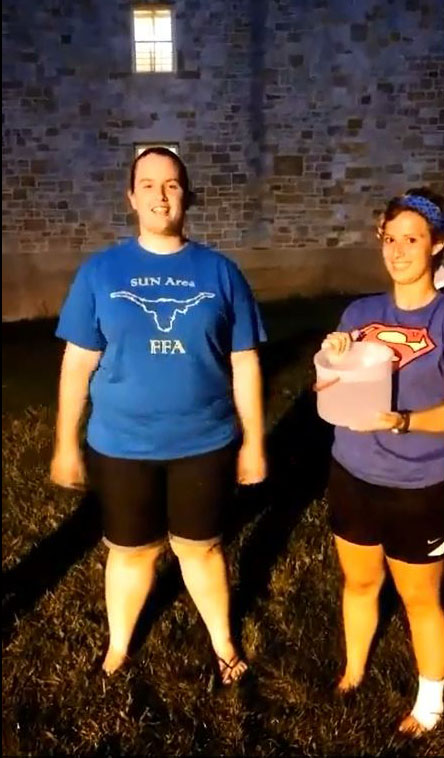Controversy surrounds ALS Ice Bucket Challenge

- Samantha Schlegel and Lauren Hampton take part in the ALS Ice Bucket Challenge.
Photo by Jenna Kauffman
By now everyone has heard of ALS ice bucket challenge, especially if you’re savvy in social media. Many have seen videos of people poring ice water over their heads; yet, little information about the disease itself is spreading.
Amyotrophic Lateral Sclerosis, also known as Lou Gehrig’s Disease, affects nerve cells in the brain and spinal cord. As the disease progresses, the body loses control to the point where they become immobile and lose the ability to do everyday things such as eat, speak, and even breathe.
By design, the ALS ice bucket challenge raises awareness and funding for the disease. The fundraiser requires a person to nominate people to dump ice water on themselves within a 24 hour period. If they fail to do so, they must donate to the ALS Association. However, many people—especially celebrities—have done both to raise awareness and to give money to the cause. The donated funds are directed to research and to care for those affected by the disease.
Yet, a new debate has arisen over the new-found popularity of this challenge. Some say that people take the challenge for attention and or without knowing anything about ALS. Others support the challenge because it has raised more money than it ever would have without so much publicity.
Adjunct Professor Susan P. Livermore, an English instructor at both Wilson College and Shippensburg University, thinks it has a negative outcome.
“Bringing awareness [to ALS] is good, but people still don’t know about the disease,” said Livermore. “It brought awareness, but not the type it should have.”
Meanwhile, Wilson student Amber Dibert ’17 thought differently, pointing out how the challenge relates to ALS.
“I’ve heard that the point of the challenge, being doused in ice water, gives you a temporary feeling of what ALS is like,” said Dibert. “The cold water provides slowed or absent movement to the body, which is what ALS does to its victims. Hopefully, it instills sympathy in the challenge undertakers, making them donate.”
Campus Chaplain Rosie Magee views it positively as well.
“Looking at this year’s huge fund raising for ALS compared to last year, I think the main thing is that the ice bucket challenge has helped raise an enormous sum of money for a worthy cause,” said Magee.
Adult Degree Program student Carol Zehosky ’15 agreed that it was important because it helped raise money for a good cause. Valeria Keefer ’17 believed that it raised awareness but didn’t totally relate.
A majority of Wilsonites interviewed said they would take the challenge or have already taken it. Only a few said they probably would not. According to a Billboard poll, 47% would take the challenge, 27% would not, 13% would not take it but would still donate, and 13% have already taken it.
The verdict still remains out. Is the ice bucket challenge a good thing? Or is it not the right way to go to raise awareness for ALS?
To donate to the ALS Association or to learn more about ALS, visit www.alsa.org.
